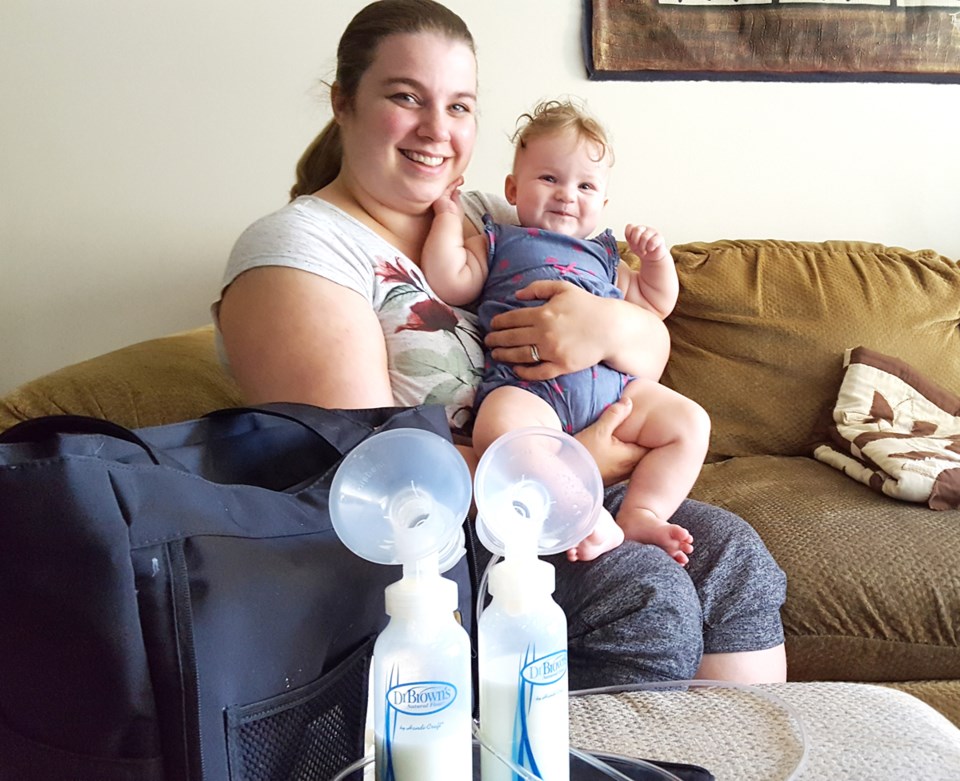There’s just no underestimating the power of giving — especially if you’re a new mom.
Not only have you given birth to a new life, you can also help nourish the early days of a fellow mom’s baby by donating your own breast milk.
On Tuesday, for the first time, generous moms were able to drop off donated milk for the BC Women’s Provincial Milk Bank at Richmond’s public health office, after previously having to travel to Vancouver.
It’s a move that is hoped will create convenience and a much-needed spike in local donations.
And it has the whole-hearted approval of relatively new Richmond mom Alexandra Allen, who, despite the apparent inconvenience, has already donated 85 litres — or four kitchen sinks worth — of breast milk to the bank.
“When I’ve dropped off my milk, I’ve seen the parents picking up donated milk,” said Allen, who gave birth to her first child, daughter Malena Braconnier, in December of last year.
“I think, my milk might be going to their baby. Those parents must be feeling so relieved.
“I can get a little of that joy by association by knowing I am helping.”
Allen, who lives near Minoru Park, started donating to the bank — which primarily provides breast milk for babies in intensive care — in mid-January.
“They wanted to wait to make sure I was producing enough for my own baby first,” explained Allen.
“I was pumping the breast milk for Malena and I realized I had an awful lot to spare.
“I didn’t actually know anything about the bank or the short supply; it was only when I went in for a doctor’s appointment that it was mentioned by accident.”
Allen subsequently heard some adverts about the short supply and, thereafter, it was a no-brainer to help.
“I certainly didn’t want to just throw it out; what a terrible waste that would be,” she added.
“But you can only do it for a year, so I’ve just got a few months left.”
According to Vancouver Coastal Health (VCH), the demand for donor human milk continuously exceeds supply and the milk bank and VCH is always looking for healthy mothers who have more breast milk than they need for their own baby.
Maureen Lister, a Richmond-based public health nurse, said that, although babies still in hospital have first dibs, there are moms in the community who don’t produce enough breast milk for their babies and are able to purchase the milk from the bank.
“But the supply is inconsistent and the priority for the milk is always for babies still in hospital and in intensive care,” explained Lister.
Fellow Richmond public health nurse Gail Morrow said they’re all hoping the new Richmond drop-off location will create a spike in local donations.
“We hope this will make it easier to drop off milk as, before, when people had to go to Vancouver, it was too far for many new moms,” said Morrow.
“We’re hoping for a significant rise in donations.”
As for any concerns about moms using breast milk from a source other than themselves, Lister explained that the donating mom is screened and lots of checks are made.
“It’s quite a strict criteria as there can’t be any underlying health conditions,” said Lister.
“And all the milk in the bank is pasteurized. The majority of the babies that are receiving the milk are very vulnerable, so all precautions are taken.
“We know human milk is the best food for babies, but some new mothers face challenges that prevent them from breastfeeding.
“Donor milk has active beneficial properties and is similar to mother’s own milk. It provides babies with antibodies to fight disease and infection, which is especially vital for premature or babies battling medical conditions.”
The Richmond Public Health Office is at 8100 Granville Ave. To learn more about the drop-off locations and donating milk, go online to VCH.ca.
The World Health Organization recommends providing only breast milk to babies until approximately six months of age for healthy growth and development. With the addition of nutritious, complementary table foods at around six months, babies can continue to be breastfed until two years old and beyond.



